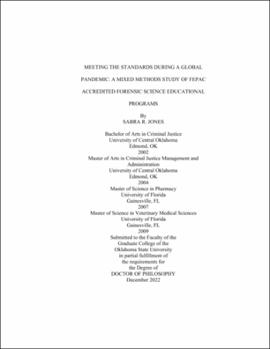| dc.contributor.advisor | Wagner, Jarrad | |
| dc.contributor.author | Jones, Sabra R. | |
| dc.date.accessioned | 2023-05-31T17:22:35Z | |
| dc.date.available | 2023-05-31T17:22:35Z | |
| dc.date.issued | 2022-12 | |
| dc.identifier.uri | https://hdl.handle.net/11244/337741 | |
| dc.description.abstract | Introduction: Standardization is used to ensure consistency and reduce variability within a given field such as forensic education. Evaluating how Forensic Science Education Programs Accreditation Commission’s (FEPAC) programs met select standards during a public health crisis may help us to understand its impact. To this end, an explanatory sequential mixed methods design employing Grounded Theory was utilized. The purpose of this study was to evaluate FEPAC accredited masters’ programs and how accreditation standards were met with a focus on the effect of a global pandemic in four core areas. | |
| dc.description.abstract | Methods: Twenty-one FEPAC masters’ programs were identified. Qualtrics was used to collect data on core standards, followed by qualitative interviews to further expand on initial findings. Interview data was analyzed with ATLAS.ti to identify themes in responses to questions. Procedures and materials were approved by Oklahoma State University Institutional Review Board. | |
| dc.description.abstract | Results: Of the 21 programs, 13 (~62%) of program directors completed the survey. Pre-pandemic, ~77% of programs offered traditional education (Core 1) with only 23% offering online courses. No programs offered online formats for more than 25% of courses. March 2020 through 2020-2021 academic year, there was variability in the number of courses offered online from 25-100% of program’s coursework. Respondents indicated moving forward a decrease in in-person courses with 62% and increase in online courses at 31%. Prior to March 2020, 100% specified that all laboratory courses were offered in in-person settings. Following March 2020, 62% in-person, 31% hybrid, and 8% offered online laboratory courses. All (100%) responded that laboratory courses would return to be offered in-person after the pandemic. All (100%) of program directors responded that they did not lose faculty members directly due to the pandemic (Core 2). Professional involvement (Core 3) remained relatively unchanged with slight shifts after March 2020. Changes to institutional support (Core 4) were identified with 54% of budgets remaining the same, 31% decreased funding, and only 8% of programs experiencing an increase in support or were not sure (8%). Post- questionnaire interviews revealed overarching themes including: Impact of the Global Pandemic, Challenges, Faculty and Student Interaction, Professional Involvement, Perceptions of Online Learning, Learning, and Positive Effects. | |
| dc.description.abstract | Conclusion: Overall, programs experienced impacts to their course offerings (lecture and laboratory) due to the global pandemic. However, most programs returned to pre-pandemic approaches (i.e., in-person coursework). Professional involvement for students and faculty was not significantly impacted; however, institutional support was reported to have increased or decreased for almost 39% of the programs. Themes identified focused on students receiving the training and education needed for degree completion (education, professionalism, available faculty, and resources) and the challenges the pandemic had on faculty and students. | |
| dc.format | application/pdf | |
| dc.language | en_US | |
| dc.rights | Copyright is held by the author who has granted the Oklahoma State University Library the non-exclusive right to share this material in its institutional repository. Contact Digital Library Services at lib-dls@okstate.edu or 405-744-9161 for the permission policy on the use, reproduction or distribution of this material. | |
| dc.title | Meeting the standards during a global pandemic: A mixed methods study of FEPAC accredited forensic science educational programs | |
| dc.contributor.committeeMember | Hess, James | |
| dc.contributor.committeeMember | Thrasher, Ronald | |
| dc.contributor.committeeMember | Miller, B. Bavette | |
| osu.filename | Jones_okstate_0664D_17903.pdf | |
| osu.accesstype | Open Access | |
| dc.type.genre | Dissertation | |
| dc.type.material | Text | |
| dc.subject.keywords | course delivery | |
| dc.subject.keywords | educational standards | |
| dc.subject.keywords | global pandemic | |
| dc.subject.keywords | professional involvement | |
| thesis.degree.discipline | Forensic Sciences | |
| thesis.degree.grantor | Oklahoma State University | |
